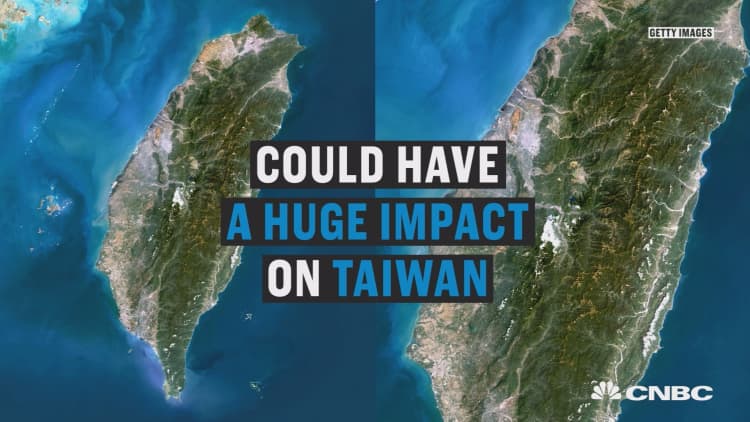BEIJING-There's at least one big loser if President Donald J. Trump ignites a trade war with China: Taiwan. The island democracy has a heavily export-dependent economy enmeshed in billions of dollars in U.S. and China trade. Any blowup would have a spillover effect that would reverberate from Silicon Valley to Taipei and Beijing.
The risk of such a war is real. For months, the billionaire businessman-turned-politician has bashed China, accusing it of manipulating its currency and stealing American jobs. More worryingly, there were concerns President Trump would break decades of upholding the "One China Policy." Fortunately, that issue blew over last week when Trump spoke with Chinese President Xi Jinping and pledged to honor that stance.

As tensions between the Trump administration and China ebb and flow, companies dependent on Taiwan are considering repositioning some operations in their global supply chains. One is Taiwanese tech giant Foxconn, a crucial Apple supplier that makes iPhones in mainland China and employs roughly 1 million of its citizens.
To win favor from the new administration, Foxconn's founder Terry Gou has said the company could partner with Apple and invest $7 billion in the U.S., suggesting a factory could be built in Pennsylvania — a Rust Belt state that helped elect Trump.
Following this, the chairman of rival Taiwan-based iPhone assembler Pegatron said it was prepared to expand its American operations by "three to five times" if necessary, according to local reports. And Quanta Computer, the world's largest maker of notebook computers and a supplier of servers for Dell and Hewlett Packard with deep roots in Taiwan, said it would double its America-based server assembly operations, building on its existing plants in Tennessee and California.
Taiwan's top 5 trading partners
| Trade Partner | Annual Exports ($B) |
|---|---|
| China | 73.9 |
| Hong Kong | 38.4 |
| U.S. | 33.5 |
| Japan | 19.6 |
| S Korea | 12.8 |
(Source: Taiwan Department of Statistics)
Taiwan's apparel industry and shoe manufacturers have have already begun moving operations elsewhere in Asia, to Vietnam, Bangladesh and India. Apparel giant Eclat Textile, supplier to Nike and Under Armor, is also weighing moving factories in the U.S., Asia Nikkei Review reported. So is Everest Textile, which bought a plant in North Carolina and is scheduled to start production there in March.
Renowned for its high-tech manufacturing acumen and managerial expertise, Taiwan depends heavily on foreign trade. Exports accounted for more than 62 percent of its $550 billion GDP last year, according to Taiwan's Ministry of Economic Affairs.
Mainland China is its largest trade partner by far, accounting for 26 percent of its exports last year, for a total of $74 billion. The U.S., Taiwan's third largest partner after Hong Kong, accounted for 12 percent.
For many years, the U.S. has run a trade deficit with Taiwan. In 2016, the island enjoyed a $13 billion surplus from America, according to U.S. Census data.
Big American corporations such as Microsoft, DuPont, 3M and IBM have extensive facilities, research-and-development and investments on the island. Advanced glass manufacturer Corning has invested billions to build two of its largest plants in the world on Taiwan.
A land in transition
A trade war between the world's top two economies would "hurt Taiwan since so much of the Taiwan's tech-oriented consumer industries are tied to those in China, as part of the global value chain," said Steve Tsang, director of the SOAS China Institute, University of London.
Taiwan can little afford such a blow, as its economy is in the midst of a difficult transition. Growth rates have been sluggish, hovering around 1 percent per year, while exports have fallen, dropping 13 percent from their $320 billion peak in 2014.
More from Global Investing Hot Spots:
North Korea's nuclear ambitions are Trump's first major test
Searching for returns in Southeast Asian stock markets
A huge global oil investor is undergoing drastic changes
Taipei was hoping for a boost from the Trans-Pacific Partnership, a trade pact among 12 Asia-Pacific countries representing 40 percent of the global economy that was spearheaded by the Obama administration. But Trump, following through on campaign promises that called it a bad deal for America, killed the TPP on his first day in office.
Meanwhile Taipei faces a backlash from China in many areas, as Beijing tries to pressure the democratically-elected Taiwanese President Tsai Ing-wen to bend to its will.
Since her election, authorities reduced mainland Chinese tourist flows to Taiwan, and encouraged Chinese clients to favor domestic semiconductor producers, taking market share from Taiwanese firms.
Worries of a backlash
Beijing has also tried to isolate Taiwan diplomatically, and if tensions spike China could pressure "other countries upon which Taiwan's export-heavy economy relies for its survival into dropping their ties with Taiwan," said J. Michael Cole, Taipei-based fellow with the China Policy Institute of the University of Nottingham.
To combat this, Tsai has tried to shift away from the mainland, cultivating ties with Southeast Asia, and pursuing an ambitious Asian Silicon Valley Development plan aiming to make the island a hub for development of the Internet of Things — technologies that connect mobile devices to appliances, vehicles, and household objects such as lightbulbs and thermostats.
While the danger of trade war looms, some hope that an apparent pro-Taiwan tilt within Trump's administration could help the island stay out of the crosshairs with China.
Thus far, "Taiwan is front and center" under Trump, "much more so than it was before in any incoming U.S. administration," said Gerrit van der Wees of George Mason University.
That means that while risks may be high, Taiwan will be "much less likely to fall off the table or be trampled when the bigger elephants fight."
—By Benjamin Carlson, special to CNBC.com




